- Home
- Sharyn McCrumb
Missing Susan Page 7
Missing Susan Read online
Page 7
“Isn’t it beautiful?” whispered Frances Coles, gazing up at the graceful succession of carved Gothic arches high above their heads.
Alice MacKenzie wasn’t ready to forgive the Conqueror for his destruction of the original church. “It’s a bit showy. What did the Saxon cathedral look like, Emma?” she whispered.
“Not so upscale,” Emma whispered back. “Based on what we found on the dig, I’d say it was a lot smaller, and the architecture was simpler. Besides, even before William trashed it, it had been damaged by the Danes during the tenth-century Viking raids.”
“Go, Vikings!” whispered Susan, who had heard only the last few words of the conversation and had assumed they were talking about her hometown football team.
Emma pretended not to have heard. “When we were excavating the ruins of the old cathedral, we found a few Viking graves. You could always tell when you’d found one who had converted to Christianity late in life. The deceased would have a cross on his chest, but just in case Odin was the right god after all, the bones would be lying in a layer of charcoal-symbolizing the flaming ship burials of the Norse religion.”
“Did you find any treasure?” asked Frances. “My pupils love stories about buried treasure.”
Emma shook her head. “Nothing much. A few Roman coins. It’s the knowledge of Saxon Britain that we valued.”
“It hardly seems worth the bother of excavating for a few lousy coins,” said Susan. “I’d want to work on a dig where there was a chance of finding treasure. Like Egypt. I’ll bet you could smuggle a lot of stuff out of the country without the authorities ever knowing. If your dig didn’t find anything worth selling, how could they afford to pay you diggers?”
“We only got four shillings a day,” Emma admitted. “That was lunch money.”
Susan hooted. “Boy, talk about your migrant workers!”
Her fellow tourists glanced at each other, but no one said anything in reply.
They walked on in silence, reading the grave markers that made up the flooring of the cathedral and listening to the explanations provided by their distinguished guide. Charles Warren, armed with a complex-looking 35 mm. camera, was taking light readings and discreetly photographing the points of interest.
They admired the nave, built in 1079 by Bishop Walkelyn, a kinsman of William the Conqueror. (“Two hundred fifty feet long and seventy-seven feet high at the ridge rib,” the guide informed them.)
After that, Elizabeth’s attention began to flag. She followed the group dutifully through the south aisle, thinking about the gift shop and the hour of free time before the one o’clock departure of the coach. She only half listened to the details of Bishop Wykeham’s transformation of the nave from three tiers to two; her admiration of the elaborately carved choir stalls of Norwegian oak was only perfunctory. She came back to full alert when the guide stopped before a collection of decorated wooden chests balanced on top of the stone side screens of the choir. “Boxes of bones,” the guide repeated.
“Bones?” echoed Elizabeth with renewed ardor.
“That is correct. In 1524 Bishop Fox placed the bones in these chests. Kings, queens, and bishops are all collected together in the boxes atop that wall. We have most of the early monarchs of England. Westminster Abbey has many of the later ones.”
“Do you ever open the boxes?” asked Elizabeth, hoping for a professional perusal of a royal skull. Examining the suture closures of William the Conqueror would be even better than waving at the present Queen from a distance of ten feet, her only royal encounter thus far.
“No,” said the guide. “We never open the boxes.”
A disappointed silence followed before the guide resumed his lecture. “Besides providing us with these boxes of royal bones, Bishop Fox has other claims to fame. He founded the college of Corpus Christi at Oxford and he served as Secretary and Lord Privy Seal to Henry VII.”
Everyone nodded politely.
“I can take you down to see the crypt if you like,” he offered.
This cheered them up immensely.
Alice MacKenzie, after wandering about the choir enclosure examining the carvings, had strayed farther afield. She called out, “Look what I found!”
The others turned to see her pointing to a simple stone slab, located beneath the tower in the very center of the cathedral. “It’s King William Rufus!” she announced.
“This afternoon we’re going to visit his death scene,” Elizabeth told the guide.
The old gentleman cleared his throat. “Ah… hmmm. It was in Winchester Cathedral that Mary Tudor married Philip II of Spain in 1554. This marriage later gave Philip some claim to the throne of England and resulted in his sending of the Spanish Armada to reinforce that claim.”
“William Rufus was murdered, you know,” said Elizabeth happily. “It’s unsolved.”
After this exchange, the old gentleman became so distracted that he had to be reminded to show the group the grave of Jane Austen as they were leaving the church.
After a picturesque but tedious walk-through of Winchester College, whose gates lay a few hundred yards from the cathedral, the group was temporarily disbanded for lunch, money-changing, or whatever other necessities suggested themselves to the ladies and Charles. They met again shortly before one o’clock in the lobby of the Wessex, where a smiling Rowan Rover awaited them, notes in hand.
“Good afternoon. Everyone behaved this morning, I trust? No going round saying ‘We have two of those at home,’ or making the vicar an offer for the altar silver?”
Wisely leaving the murder discussion unmentioned, they swore that they had behaved in an exemplary fashion. Then they allowed themselves to be shepherded aboard the bus for the afternoon’s outing to the New Forest. They still occupied the front half of the vehicle, sitting two by two, like good schoolchildren. Rowan Rover took up his accustomed front row seat next to the coach door. Elizabeth, who obviously considered herself the tour’s other murder specialist, slid in beside him. Susan Cohen sat alone in the other front seat and directed most of her remarks to Bernard, who pretended to be inordinately occupied with driving.
The day was bright and sunny, too warm even for a sweater: perfect weather for exploring the country lanes of rural Hampshire. Bernard eased the coach out of the parking lot. The coach rumbled slowly through the narrow streets of Winchester and headed for the A303 motorway south. A few miles outside the city, they would pick up the A31, which would take them southwest, bypassing Southampton, and in an hour’s time they would be exploring the winding lanes of the New Forest.
“We will, of course, return to the hotel tonight for dinner and our second night’s stay. Meanwhile, to start off this afternoon’s jaunt, I must tell you a thing or two about the New Forest,” said Rowan Rover, leaning into his microphone like a rock star. “It isn’t new-and it isn’t a forest.”
“I’m not surprised,” said Maud Marsh. “The British are always misnaming things. At lunch today they gave me a 7-Up and tried to tell me it was lemonade.”
Kate Conway leaned forward in her seat, her pretty face the picture of bewilderment. “But, Rowan, if it isn’t a new forest, then what is the New Forest?”
“For one thing, it’s a thousand years old. In this country, I suppose that millennium-old things can be considered relatively new. It was the hunting preserve of William the Conqueror.”
“Him again!” snapped Alice MacKenzie. “I suppose he destroyed a few villages to make this wilderness?”
“There are rumors to that effect,” Rowan agreed. “And the preserve isn’t a forest in the usual sense of the word. It is simply a wilderness area, comprised of heath, bog, and woodland that was not to be farmed or built upon. It was a game preserve for the noblemen-and only for the noblemen. Poachers were hanged. In fact, a commoner could have his eyes put out just for disturbing the huntsmen at their sport.”
“Then how pleasant that the king should have been murdered there,” said Elizabeth, with a republican glint in her eye.
Rowan Rover beamed. “Yes, I thought you colonials would feel that way. It was not, alas, William the Conqueror who met with this poetic justice. It was his son and successor William the Red, or William Rufus, as they called him, in lieu, perhaps, of Junior.”
“Was he killed by a rebellious peasant?” asked Alice hopefully.
“No, it’s much more sinister than that. Are you at all familiar with the case?” They all shook their heads.
“We saw his grave in the cathedral this morning,” said Frances Coles.
“Interesting the way he ended up there,” said Rowan with a knowing smile. “Here’s what happened. On the evening of August second, in the year 1100, the red-haired King William II was finishing up a day’s hunting with his seven fellow sportsmen. Incidentally, the way the Normans hunted game is absurd.”
“Bow and arrow?” guessed Charles Warren.
“Yes, but they were complete idiots about it. For a stag hunt the band of archers would hide behind trees surrounding a clearing. When the beaters drove the deer forward into the clearing, all seven hunters would shoot wildly in the general direction of the other six.”
“That sounds more like Russian roulette than deer hunting,” said Charles Warren, shaking his head.
“It was madly dangerous. The wonder isn’t that the king was shot, but that anybody ever came out of such a hunting party alive.”
The group digested this information. Finally Martha Tabram said thoughtfully, “I suppose that such a system might be useful if you were interested in arranging a number of plausible accidents.”
“Yes, I thought of that,” said Rowan. “If the king was angry with any of his henchmen, he could arrange a hunting party and tell the other six not to aim at the deer. Anyhow, on that August evening, the stag got away, and it was the king who took an arrow in the heart.”
Kate Conway, the nurse, looked shocked. “Was he shot deliberately?”
“I’m rather fond of the official story,” Rowan said with a grin. “According to the other five hunters, the king’s companion Walter Tyrrel shot an arrow at the stag; it ricocheted off the animal’s back-and struck the king in the heart.”
Charles Warren burst out laughing. “What a line! Did anybody actually believe it?”
“I myself consider it on a par with Woody Allen’s joke about the man who committed suicide by shooting himself from a passing car. Walter Tyrrel was not charged with regicide. That does not, of course, mean that he wasn’t guilty. It may simply mean that influential people were glad it happened. The fascinating element about the accident is that as soon as Tyrrel had killed the king, the entire hunting party fled the New Forest without a backward glance.”
“What did they do with the king?” asked Kate, frowning at this medieval example of hit-and-run. “He would have gone into shock almost immediately.”
Rowan chuckled. “So did they, I expect. They left him right where he had fallen. Several hours later a peasant passing through the forest found the body abandoned in the clearing. He loaded it onto his cart and carried it the twenty miles to Winchester.”
“They left the king’s body unattended? That seems rather disrespectful of his companions,” said Elizabeth, whose royalist tendencies were never far from the surface.
“It suggests that their loyalties lay elsewhere,” Rowan agreed.
“Wasn’t the king a nice person?” asked Miriam Angel, who evidently pictured the late king as a Dark Ages version of Prince Charles. She drew her tweed jacket close around her, as if the chill of terrorism still lingered.
“Chroniclers of the time suggest that he was quite depraved,” the guide told her. “They mention vices that delicacy forbids them to enumerate.”
“French,” said Alice darkly.
Rowan Rover shook his head. “I don’t think sexual misconduct would have upset them much, no matter what his choice of partner: choirboys, sheep, whatever. Kings were entitled to their hobbies. Besides, in those days it was religion, not sex, that scandalized decent people.”
“Religion?” said Kate.
“They think he may have belonged to some sort of occult group. I’m not an authority on such matters, though. I think we can assume that he was not held in esteem by anyone. But when one is discussing the monarchy, personal popularity is only incidental, don’t you think?”
“Somebody wanted his job,” Emma Smith said, by way of translation.
Rowan Rover nodded sagely. “Almost certainly. And they may have had excellent reasons for wanting him off the throne. Students of detection will be interested to learn that the king was killed on Thursday evening; his body reached Winchester by cart on Friday morning. By Friday noon he was buried, and that afternoon, his younger brother Henry had seized the Treasury, and was making his way to London to be crowned himself. There was no funeral for William, by the way, and no masses were said for his soul. He was simply dumped in his grave without ceremony.”
“How very odd,” said Martha Tabram with her usual air of calm detachment. “Kings are divinely appointed, according to tradition. Surely the priests at Winchester would have been in awe of the royal person, dead or not, and would have felt obliged to give him some sort of Christian burial.”
“There are rumors,” said Rowan Rover in ominous tones. “Legend has it that the wooden arrow was never removed from William’s chest. Does that remind you of anything?”
“A wooden stake through the vampire’s heart!” cried Elizabeth.
“Something of the sort.” Trust the Yanks to know Bram Stoker better than the Venerable Bede, he thought. Rowan sneaked a look at his notes. “The coffin was opened in 1868-I’m not sure why-and a wooden shaft was found among the bones.”
“The arrow!” cried Frances Coles.
“But we still don’t know who wanted him killed,” said Kate, frowning.
“One doesn’t like to be suspicious,” said Elizabeth, who was always willing to give royalty the benefit of the doubt, “but did William’s successor seem like the sort of person who would have had his own brother killed in order to seize power for himself?”
Rowan Rover shrugged. “Henry the First? Well, he had his other brother’s eyes put out for trying to escape from house arrest.”
Alice MacKenzie nodded triumphantly. “Bad blood in that family! I’ll bet he wasn’t much of an improvement as monarch.”
“Thank God my relatives aren’t like that,” said Susan Cohen.
The guide paused for a moment with his mouth open. Finally he recovered enough to say, “As the Victorian lady said when she saw a production of Antony and Cleopatra: ‘How very different from the home life of our own dear Queen.’ ”
Elizabeth was still considering the list of suspects. “Did Walter Tyrrel get anything from the new king? Was he made Lord Chancellor, or archbishop, or anything?”
“Not that I know of,” said Rowan. “After eight hundred and ninety years, it’s a bit late to be checking bank balances, and testing alibis.”
Alice MacKenzie made a note in her travel diary: Find out what became of Walter Tyrrel. Rowan pointed to the coach windows. “We are coming into more intriguing country,” he remarked. “We have been traveling southwest and we are now between Salisbury and Bournemouth, heading for the tiny village of Minstead, in the heart of the New Forest. Has anyone read anything of Conan Doyle besides the Sherlock Holmes stories?”
They shook their heads.
“Did he write something else?” asked Frances.
Rowan Rover did not trust himself to elaborate. “He did. Sir Nigel, a character in The White Company, lives at Minstead. Conan Doyle himself lived east of here in Crowborough.”
“What beautiful hedges!” said Nancy Warren. “Lovely gardens-and no billboards or gas stations. You can’t tell it’s the twentieth century here at all.”
“The price of a pint in the pub will give you a hint,” muttered Bernard from the driver’s seat.
“Notice these picturesque cottages with their thatched roofs,” said R
owan into the microphone. “Don’t be fooled by all this rustic simplicity. These places cost the earth.”
Susan Cohen looked unimpressed. “If you knew what my grandfather’s house cost, you’d probably faint.” She stifled a yawn.
“A pony!” cried Frances. “Look! He’s wandering around loose beside the road.”
“It’s a New Forest pony,” said Rowan. “They’re wild. They still roam about wherever they like, so it’s just as well that these narrow roads force one to go slow.”
There was a pause while everyone in the coach waited to hear if there were wild ponies in Minnesota, but Susan had nodded off to sleep and was unavailable for comment. Rowan Rover leaned back in his seat and contemplated the hazardous possibilities of pastoral Hampshire. Fortunately or unfortunately, incompetent Norman archers no longer roamed the wilderness. It also seemed unlikely on this first day of the tour that Rowan would be able to bonk his victim on the head with a log in a peaceful forest glade without the presence of a gaggle of horrified onlookers. He knew that he could not expect to share Walter Tyrrel’s good fortune in his witnesses: this lot would not run away in terror and say no more about the incident. Trust them to fight each other for pride of place on the evening news in their eagerness to shop him to the CID. He daren’t risk anything. Rowan hunched down in his seat, oblivious to the glorious warmth of the late summer day.
After a few more minutes of travel through country lanes scarcely wider than the coach, Bernard eased into an expanse of grass at a crossroads facing a half-timbered pub. “Minstead,” he announced. “I’m not sure that road will take this vehicle, though.” He indicated an even smaller hedge-lined road that led uphill from the pub.
Rowan Rover consulted his notes. “It can’t be far. Minstead is a small village. Why don’t we get out and walk to the church? It’s just a little way up this road.”

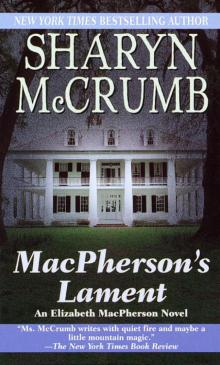 Elizabeth MacPherson 07 - MacPherson’s Lament
Elizabeth MacPherson 07 - MacPherson’s Lament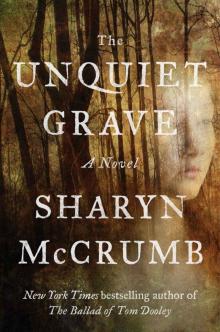 The Unquiet Grave: A Novel
The Unquiet Grave: A Novel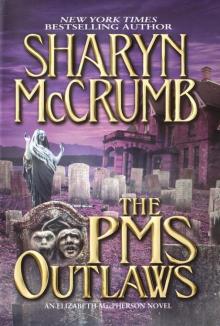 The PMS Outlaws: An Elizabeth MacPherson Novel
The PMS Outlaws: An Elizabeth MacPherson Novel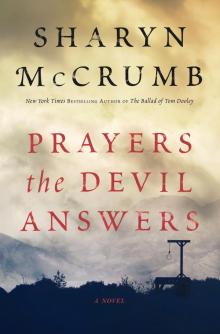 Prayers the Devil Answers
Prayers the Devil Answers Paying the Piper
Paying the Piper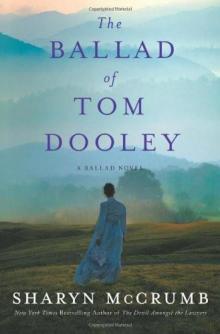 The Ballad of Tom Dooley: A Ballad Novel
The Ballad of Tom Dooley: A Ballad Novel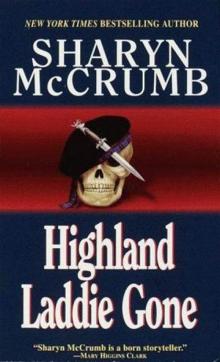 Highland Laddie Gone
Highland Laddie Gone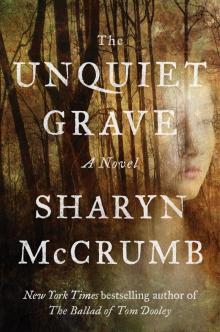 The Unquiet Grave
The Unquiet Grave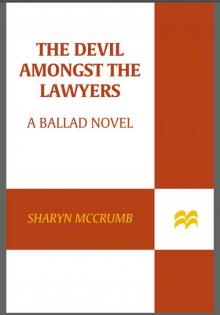 The Devil Amongst the Lawyers
The Devil Amongst the Lawyers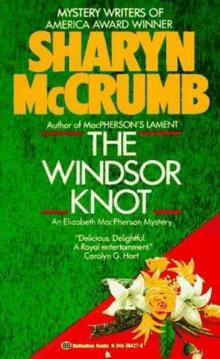 The Windsor Knot
The Windsor Knot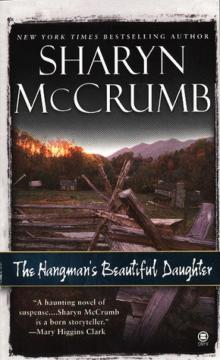 The Hangman's Beautiful Daughter
The Hangman's Beautiful Daughter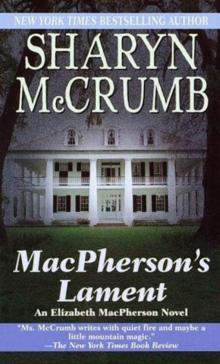 MacPherson's Lament
MacPherson's Lament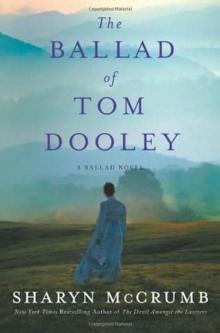 The Ballad of Tom Dooley
The Ballad of Tom Dooley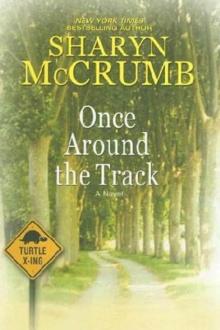 Once Around the Track
Once Around the Track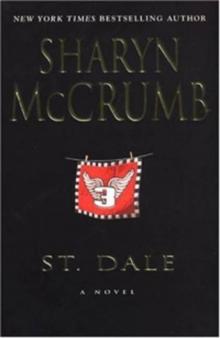 St. Dale
St. Dale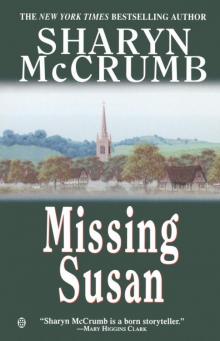 Elizabeth MacPherson 06 - Missing Susan
Elizabeth MacPherson 06 - Missing Susan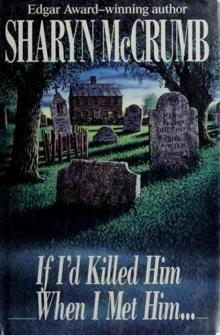 If I'd Killed Him When I Met Him…
If I'd Killed Him When I Met Him…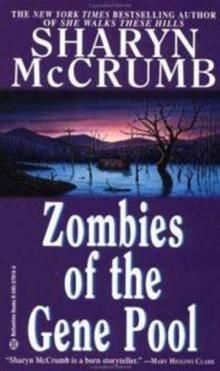 Zombies of the Gene Pool
Zombies of the Gene Pool Bimbos of the Death Sun
Bimbos of the Death Sun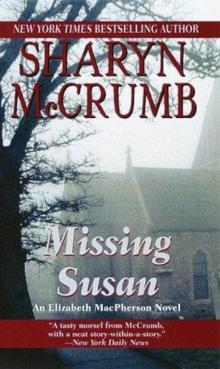 Missing Susan
Missing Susan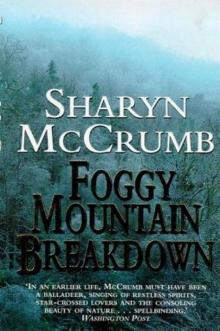 Foggy Mountain Breakdown and Other Stories
Foggy Mountain Breakdown and Other Stories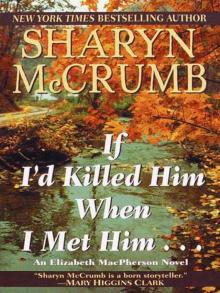 If I'd Killed Him When I Met Him
If I'd Killed Him When I Met Him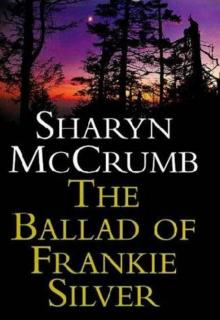 The Ballad of Frankie Silver
The Ballad of Frankie Silver Lovely In Her Bones
Lovely In Her Bones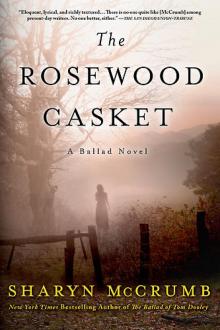 The Rosewood Casket
The Rosewood Casket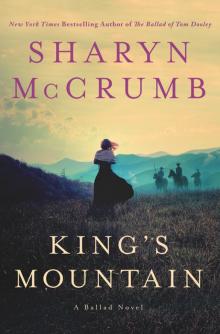 King's Mountain
King's Mountain